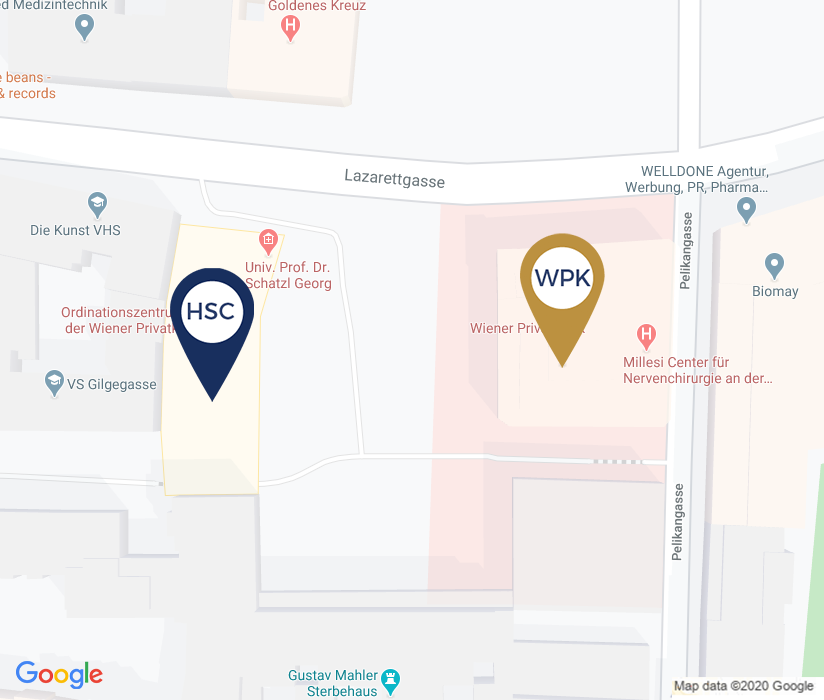
- Worker rights and responsibilities
- Moving to Austria
- Working in Austria

Working as a nurse/caregiver in Austria
Care professions as “shortage occupations” .
There are various possibilities in Austria to work in care professions (“Pflegeberufe”). The following three care professions are so-called shortage occupations (“Mangelberufe”). In principle, this means that you can apply for a Red-White-Red – Card for Skilled Workers in Shortage Occupations :
- Registered nurse responsible for general care (“Diplomierte:r Gesundheits- und Krankenpfleger:in”)
- Nursing assistant level 2 (“Pflegefachassistent:in”)
- Nursing assistant level 1 (“Pflegeassistent:in”)
You will have to prove the following within the context of this application:
- Completed professional training as a registered (qualified) nurse, a nursing assistant level 2 or a nursing assistant level 1
- A binding offer of employment (“verbindliche Stellenzusage”) in Austria
- A specified minimum number of points within the context of the point system (“Punkteschema”).
If you want to work as a 24-hour caregiver (“24-Stunden- Pfleger:in”), you are not allowed to apply for a Red-White-Red – Card!
Validation or nostrification of training completed abroad
If you have completed your training abroad e.g., in your native country as a registered nurse, nursing assistant level 2 or nursing assistant level 1 and would like to work in Austria, your training documents and certificates will have to be recognised (validated) in Austria.
Various bodies are responsible for this process:
- The universities of applied sciences are responsible for the nostrification (“Nostrifizierung”) of training as a registered nurse from a third country (i.e., from a country which is not part of the EU or EEA).
- The Office of the Provincial Government (“Amt der Landesregierung”) of the respective federal province in Austria in which you intend to work is responsible for the validation process.
- The Federal Ministry of Social Affairs, Health, Care and Consumer Protection is the responsible body if you have concluded your training in an EU member state.
- The Federal Ministry of Social Affairs, Health, Care and Consumer Protection is also the responsible body if you have concluded your training in a third country but have already had this training recognised in another EU member state.
Working during the validation/nostrification process
If you have concluded your training abroad and this corresponds to Austrian higher training for nursing care, and you would like to work in Austria before the completion of the nostrification process, you can submit a special application to the Office of the Provincial Government in the particular federal province in which you intend to work.
If this application is approved in accordance with the Health and Nursing Act, you will be allowed to work in the field of nursing for a period of up to one year (extension possible for a further year) for training purposes and under direction and supervision.
Under certain circumstances, the working as a nurse/caregiver and the application for a Red-White-Red - Card is also possible without authorization according to the Health and Nursing Act, namely if it was determined during the application for recognition/nostrification that the equivalence is generally given and only individual supplementary exams to the full equivalence are missing. You can register in the so-called health professional register ("Gesundheitsberuferegister") in the respective lower-level nursing/caregiving profession and to work within two years of the issuance of the nostrification notice. The other requirements for registration in the health professional register must also be met.
There are exceptions with regard to the Red-White-Red – Card for Skilled Workers in Shortage Occupations for persons who have been granted permit pursuant to Section 34 of the Health and Nursing Act or with regard to whose training it was determined during the application for recognition/nostrification that the equivalence is basically given:
If you have received a permit pursuant to Section 34 of the Health and Nursing Act but you have not completely fulfilled all requirements for nostrification, you can still apply for a Red-White-Red – Card for Skilled Workers in Shortage Occupations. You do not have to wait for the nostrification. However, in accordance with the notification supplied by the university of applied sciences, your training must be considered as eligible for nostrification.
Even if it was determined during the application for recognition/nostrification that equivalence is basically given, and only individual additions to full equivalence are missing, it is possible to apply for a Red-White-Red – Card as a Skilled Worker in a Shortage Occupation even before the completion of the nostrification procedure.
Nevertheless, you will have to score enough points in line with the point system (for language skills, professional experience, age).
Working after completion of the validation/nostrification process
You will first obtain complete recognition of your qualifications to work in the field of nursing or in the field of healthcare assistance when the validation/nostrification process relating to your training is fully completed.
Afterwards, you will have to entered into the so-called health professional register (“ Gesundheitsberuferegister ”). In turn, for this purpose, you will have to demonstrate German language competencies at a B1 or B2 level (depending upon which health career you intend to pursue).
Do you have any questions about a residence permit (“Aufenthaltstitel”) with respect to your work as a nurse? Do you want to employ a nurse who has concluded his or her training abroad and wonder if this person can get a Red-White-Red – Card?
Free services for skilled workers and companies
The ABA Immigration and Residence Services offer free consulting with an official mandate by the Austrian Government.
More blog posts

Double the amount of Red-White-Red – Card consultations
Last year WORK in AUSTRIA conducted 3,889 consultations for Red-White-Red – Cards within the context of the legally embedded “ABA Immigration and Residence Services” service centre.
- Living in Austria

The “Job Seeker Visa”
Jasmin Bernecker
- Success Stories

Primetals Technologies
The British multinational Primetals Technologies relies on an international team at the company’s site in Linz.
Related articles
- How to find a job

How international students can settle down in Austria

7 good Reasons for working in Austria
Ines Vodanovic
We use cookies to ensure that we give you the best experience on our website. Find out more in our Privacy Statement .
- You pick the destination, we have all the visa information ready

- How to Work and Immigrate to Austria as a Nurse?
Are you a nursing professional dreaming of new horizons? Imagine the rich cultural tapestry of Vienna, the charm of the Austrian Alps, and the opportunity to advance your nursing career in one of Europe’s most beautiful settings. Welcome to our guide on ‘How to Work and Immigrate to Austria as a Nurse’ – your first step towards a life-changing journey in the heart of Europe.
Table of Contents
How Can I Work as a Nurse in Austria?
To work as a nurse in Austria, you must follow the steps listed below:

- Secure a Job Offer
- Red-White-Red Card Application
- German Language Proficiency
- Registration in the Health Professional Register
- Temporary Work Permission
Step 1. Secure a Job Offer
Obtaining a job offer is the first critical step when you decide to immigrate to Austria as a nurse. This involves a proactive job search, targeting healthcare institutions where your skills are most needed. Since nursing is often recognized as a shortage occupation in Austria, skilled nurses are in high demand. A job offer is not just proof of your professional capabilities but also forms the basis for subsequent immigration and work permit applications.
For your job search, you can utilize online portals such as Karriere.at, StepStone Austria, and Indeed Austria, which frequently list nursing positions. Healthcare recruitment agencies like EPSN Workforce, Trenkwalder, and Headcount Solutions are valuable resources. It’s essential to tailor your application to meet the specific requirements of Austrian healthcare employers. Networking, attending job fairs, and connecting with professional associations can also be effective strategies.
Step 2. Red-White-Red Card Application
The Red-White-Red Card is a special work visa issued by the Public Employment Service ( Arbeitsmarktservice, AMS ) for skilled workers in shortage occupations, like nursing. To apply, you must present a binding job offer in Austria and meet the criteria set out in the Austrian points system, which assesses factors like professional experience and language skills.
Successfully acquiring this card allows you to legally work in Austria for 24 months, with the possibility of extension or transition to permanent residency. This card streamlines the process for skilled workers to enter and work in Austria, aligning with the country’s demand for professional expertise in healthcare.
Step 3. German Language Proficiency
Proficiency in German is essential for nursing professionals in Austria, as it’s the primary language in healthcare settings. Depending on your role and responsibilities, you must demonstrate language competence, typically at a B1 or B2 level. You can find some examples below:
- Goethe-Zertifikat
- Telc Deutsch
- DSH (Deutsche Sprachprüfung für den Hochschulzugang)
Language skills are a regulatory requirement and crucial for effective communication with patients and colleagues. Achieving this level of proficiency may require attending language courses and passing a recognized language test. This ensures you can immigrate to Austria as a nurse.
Step 4. Registration in the Health Professional Register
Registration in the Austrian Health Professional Register is a pivotal step for people wishing to immigrate to Austria as a nurse. This process commences once your nursing qualifications, whether acquired in Austria or abroad, are recognized. The registration is a formal acknowledgment of your compliance with Austrian healthcare standards and regulations. It’s not merely a procedural step; it’s a significant mark of your qualification and eligibility to provide healthcare services in Austria. The registration confirms to employers and patients that you meet the professional and ethical standards expected of healthcare practitioners in Austria.
The process involves submitting your personal information, professional credentials, evidence of German language proficiency, and other necessary documentation to the Austrian health authorities. Being listed in this national database is essential for maintaining the quality of healthcare services. Moreover, it is crucial for ensuring patient safety and upholding the high healthcare standards in Austria. This registration affirms nurses’ skills and dedication and enhances their professional standing and mobility within the Austrian healthcare sector.
Step 5. Temporary Work Permission
Temporary work permission in Austria offers a practical solution for foreign-trained nurses awaiting full recognition of their qualifications. This permit allows you to work in a supervised role within the Austrian healthcare system, offering a chance to gain hands-on experience and Get acquainted with the healthcare practices and standards in the local area. It’s an essential step for integrating into the Austrian healthcare environment, showcasing your commitment and adaptability to potential employers. This interim arrangement benefits both nurses in transition and the Austrian healthcare sector, ensuring a smooth and efficient integration of skilled nursing professionals.

How Much Are Nurses Paid in Austria?
The salary of nurses in Austria can vary based on factors such as experience, qualifications, the type of healthcare facility, and the region. The average salary for a nurse in Austria typically ranges from approximately €30,000 to €45,000 per year. Entry-level positions may start at the lower end of this range, while experienced nurses, especially those with specialized skills or in senior positions, can earn towards the higher end.
These numbers are subject to fluctuations and may differ; thus, checking current salary data or job listings for the most accurate and up-to-date information is advisable.
Additionally, salaries can also be influenced by additional benefits, working hours, and overtime pay.
What Are Some Nursing Jobs in Austria for Foreigners?
Foreigners can find nursing jobs in Austria in various healthcare settings but must meet specific criteria. Hospitals, private clinics, elderly care homes, and home healthcare services are common workplaces. Foreign-trained nurses must have their qualifications recognized by Austrian authorities and typically demonstrate German proficiency.
Non-EU/EEA citizens require a work permit and visa, usually sponsored by an Austrian employer. Professional registration with the Austrian Health Professionals Association is also necessary. These positions offer an opportunity to work in a country with a high standard of healthcare. Still, it’s crucial to navigate the process of recognition, language requirements, and legal work permits.
How Many Nurses Are There in Austria?
Roughly 99.000 individuals are working in non-medical health professions in Austria’s hospitals. This figure includes nurses but is not exclusive to them, encompassing all non-medical health staff. Additional data sources would need to be consulted for a precise count of nurses.
Is Austria in Need of Nurses?
Yes, like many European countries, Austria experiences a demand for nurses. This demand is driven by factors such as an aging population, a growing need for healthcare services, and a shortage of healthcare professionals in certain areas. Hospitals, clinics, elderly care facilities, and home care services are sectors where nurses are particularly in demand.
The need for nurses in Austria provides local and internationally trained nurses opportunities. However, for those outside Austria, it’s essential to meet specific requirements like language proficiency in German and recognition of foreign nursing qualifications by Austrian authorities if they wish to immigrate to Austria as a nurse.
This situation makes nursing a promising career path in Austria, offering opportunities for employment and professional growth in a country known for its high standard of living and quality healthcare system.
Can a Foreigner Get a Job in Austria as a Nurse?
Yes, foreigners can work as nurses in Austria, but they need to meet Austrian nursing education and licensing standards. Proficiency in German is essential, and qualifications from abroad may need recognition. Finding a job offer, securing a work permit, and potentially obtaining a residence permit are part of the process.
What Are Some Nursing Assistant Jobs in Austria?
In Austria, nursing assistant jobs include roles in hospitals, nursing homes, and home healthcare services. Responsibilities often involve assisting with patient care, such as bathing, dressing, and primary medical care. Nursing assistants support registered nurses and doctors, help with mobility and exercise routines, and monitor patient health. These positions typically require specific training and may also require German language proficiency. Additionally, nursing assistants play a crucial role in patient comfort and emotional support.
How to Become a Nurse in Austria?
Becoming a nurse in Austria involves several steps, which include education, obtaining licensure, and meeting language requirements. Here’s a detailed overview:
- Student Visa
- Language Proficiency
- Continuous Education
- Recognition of Foreign Qualifications(If Applicable)
- Work Permit and Residency (for Non-EU Citizens)
- Joining a Professional Association
Step 1. Education
- To become a registered nurse in Austria, you must complete a nursing program. This usually involves a three-year diploma program offered at healthcare schools (Gesundheits- und Krankenpflegeschulen) or a bachelor’s degree in nursing from a university.
- The program consists of both theoretical and hands-on instruction in various areas of healthcare.
Step 2. Licensure
- After completing your education, you must obtain a nursing license from the Austrian health authorities. This license is necessary to work legally as a nurse in Austria.
- The licensing process might include exams or assessments to test your medical knowledge and skills.
Step 3. Student Visa
- First, to apply for a student visa for Austria, secure admission to an Austrian educational institution, ensuring you meet their requirements. Prepare the necessary documents, including evidence of financial assets, health insurance, and a clean criminal record certificate. Submit a visa application at the Austrian embassy or consulate in your home country, attend any required interviews or biometric appointments, and await the visa decision.
- Once approved, travel to Austria before the visa’s expiration date, complete any local registration and apply for a residence permit if your stay exceeds 6 months. Throughout your studies, adhere to Austrian regulations and maintain your student status.
Step 4. Language Proficiency
- Proficiency in German is crucial, as it’s the primary language used in healthcare settings in Austria. You should prove your proficiency through a recognized language test.
- The required level of language proficiency can vary, but generally, a B2 level under CEFR is expected.
Step 5. Job Search
- After obtaining your license, you can apply for nursing positions. Hospitals, health clinics, and other healthcare facilities are the primary employers.
- Online job portals like Karriere.at, StepStone Austria, and Indeed Austria offer a range of listings for nursing job opportunities in Austria. Recruitment agencies such as EPSN Workforce, Trenkwalder, and Headcount Solutions also specialize in healthcare, providing access to various nursing positions. These resources are instrumental in facilitating a targeted job search in the nursing field.
Step 6. Continuous Education
- In Austria, nurses are required to participate in continuous professional development to ensure the currency of their skills.
- This may involve attending workshops, seminars, or additional training courses.
Step 7. Recognition of Foreign Qualifications(If Applicable)
- If you obtained your nursing qualification outside of Austria, you would need to have it officially recognized by the Austrian authorities.
- This process might involve additional tests or adaptation periods depending on where and how you were trained.
Step 8. Work Permit and Residency (For Non-EU Citizens)
- If you are from a non-EU country, you must also obtain work and residence permits to live and work in Austria legally.
Step 9. Joining a Professional Association
- While not mandatory, joining a professional nursing association can provide benefits like networking opportunities, access to advanced development resources, and updates on changes in healthcare policies, specifically for those who would like to immigrate to Austria as a nurse.
How Many Years Is Nursing in Austria?
In Austria, the duration of nursing education typically involves a three-year diploma program. This program, offered at healthcare schools, combines theoretical instruction and practical training necessary to become a registered nurse. Alternatively, one can pursue a bachelor’s degree in nursing, which also generally spans three years.
Immigrate and Work as a Nurse in Austria: Let’s Recap!
Embarking on a nursing career in Austria presents a unique blend of professional growth and cultural enrichment. With its high demand for skilled nurses, comprehensive training programs, and a commitment to quality healthcare, Austria offers a rewarding pathway for both local and foreign nursing professionals. If you would like to get informed about how to immigrate with your job to another country, please read our articles .
What Are the Requirements to Work in Austria?
To work in Austria, you need recognized qualifications, language proficiency (usually German), and, for non-EU citizens, a work and residency permit specifically for those who are exploring to immigrate to Austria as a nurse.
What is the IELTS Score Required for Nurses in Australia?
For nurses in Australia, the required IELTS score is generally 7.0 overall and no less than 7.0 in each component.
What are the Nurse Requirements in Austria in a Nutshell?
Austria’s nurse requirements include recognized qualifications, B2 German proficiency, registration in the Health Professional Register, and a work permit for non-EU citizens.
How Much is the Average Nurse Salary in Austria?
The average salary for a nurse in Austria ranges from €30,000 to €45,000 per year, depending on experience and qualifications.
Are There Any Filipino Nurses in Austria?
Yes, there are Filipino nurses in Austria, though they must meet the standard requirements for foreign-trained nurses.
Can I apply for permanent residency in Austria after working as a nurse?
Yes, you can apply for permanent residency in Austria after working as a nurse, typically after five years of continuous legal residence and employment.
Are there specific areas in Austria with a higher demand for nurses?
Certain regions, mainly rural and less densely populated areas and major cities like Vienna, often demand nurses more due to demographic factors and healthcare needs.
- Published by
- Visa Library
- November 21, 2023
How useful was this article?
Click on a star to rate it!
Average rating 2 / 5. Vote count: 2
No votes so far! Be the first to rate this article.
Before you can apply to become a teacher in British Columbia, Canada, or anywhere else in the country, you need…
Yes, it is indeed feasible to convert your current visa status in South Korea from student (D2) to dependent family…
Yes, you can practice dentistry or teach at dental schools in Malaysia after earning your Bachelor of Dental Surgery degree…
- Events, Media and Press

- Corporate Philosophy
- History of WPK
- Medical Management
- International Patients
- Awards & Quality
- WPK Office Bucharest
- Core Competences
- WPK Academy Cancer Center
- Radiology Center
- Aeromedical Center
- Amethyst Radiotherapy Vienna
- Osteopathic Medicine, Physical Therapy
- Further Medical Services
- Useful Information for Admission
- Payment Information
- Recovering & Healing in Luxury
- Book appointment
- Book Video Consultation
- Online Health Care Center
- Transcranial pulse stimulation
- What is anemia?
- World’s Best Hospitals 2021

Austria Nurses Vacancy
We want you.
INTRODUCTION OF THE VIENNA PRIVATE HOSPITAL
The Wiener Privatklinik (WPK) has been operating since 1995 as Wiener Privatklinik Betriebs-Ges.m.b.H. & Co.KG. Since 2005 the private hospital in Vienna has been extended from one to two building parts. The WPK is one of the leading private hospitals in Austria and offers up to date equipment, new diagnostics options and the best medical and nursing care for the patients.
In 2015, the day clinic was opened, in which various interventions and examinations can be performed during a day hospital stay. The technical equipment in the hospital, such as interventional angiography, endoscopy and operating theathers are at the highest technical standards and with the newly developing Radiation Clinic the WPK is the only private hospital in Vienna and Austria that offers these diagnostic and therapeutic options.
PHILOSOPHY AND GUIDANCE
- We understand our patients as unique, individual people
- Our nursing services combine competence with empathy
- The appreciation of our employees is visible through transparent information and constructive communication
- We pay attention to the individual needs of our employees and promote their strengths
- professional quality in nursing for us means working accordingly to guidelines and standards and ongoing professional develoment
- We work according to jointly defined target agreements
Our goal is to offer first-class interaction of medical supplies, competent nursing-care and state-of-the-art hospital management to provide excellent care for patients and an optimal working environment for attending physicians and nursing staff. Currently the clinic provides 140 beds in single and double rooms for it‘s demanding patients and is particularly known for its success in the fields of internal medicine, oncology, trauma surgery, sports traumatology, surgery and orthopedics.
Due to the proximity to the Vienna University Hospital – AKH and the close contact to the medical researchers and medical professionals there, patients can be treated with the best and most modern therapies. Mixing the greatest possible flexibility, high management- and nursing skills and state-of-the-art equipment, the clinic can score over other hospitals and competitors.
NURSING CARE WITH EMPATHY AND EXPERTISE
Modern nursing-management combines competence with humanity and our Patients benfit from this during their stay in the hospital. Patients are taken seriously with all their needs, expectations and fears and experience empathic and professional Nursing care on the highest level.
Our Nurses are also contact persons for family members and relevant others of our patients. In the sense of a holistic and family-centered care we support and advise our patients and their relevant others. In complex caring situations our discharge management prepares the home discharge or the transfer to a nursing home.
In order to keep our nurse’s knowledge up-to-date, evidence-based trainings and further education is offered on an ongoing basis for the nursing team at the WPK. We have implemented a new training concept in the form of „One Minute Wonders“ (we call them one minute Fortbildungen = OMF). The entire nursing departement in the WPK is certified according to the internationally recognized standard ISO 9001. The ISO standard defines standards for setting up a quality management system and is used as a structuring tool. Due to this risks during nursing procedures can be recorded more efficiently and the susceptibility to errors can be minimized.
MEDICAL SUPPLY BY THE PHYSICIANS OF THE VIENNA PRIVATE HOSPITAL
In addition to the hotel component, medical know-how is the first obligation towards our patients. The clinic is well known for its achievements in the fields of internal medicine, oncology, trauma surgery, sports traumatology, surgery, thoracic surgery and orthopedics.
Scientific Advisory Board Through the implementation of a scientific advisory board the highest quality in medicine and also quality control can be assured for all medical procedures in the Wiener Privatklinik. The scientific advisory board is acting independently Quality assurance in medicine, quality control and the latest standards in treatment are guaranteed by the Scientific Board of Wiener Privatklinik. This independent acting scientific advisory board currently consists of ten professors from the Medical Faculty of the Medical University of Vienna.
- Physician‘s further education and training by the Forum for Private Medicine The “Forum Private Medicine”, initiated by the Wiener Privatklinik, organizes several times a year events on medical topics. These events are recognized by the Austrian Medical Association.
CORE COMPETENCES
Caring for patients with large variety of medical conditions gives you the opportunity to acquire a wide range of specialist knowledge. Especially for young nurses this generalistic approach in our hospital offers a big advantage, since you can acquire broad nursing expertise. For the future, this opens up the opportunity to work in different departments and thus increases your attractiveness for future employers. You also have the opportunity to specialize in various fields (e.g. in the field of oncology nursing or as operating theater nurse).
We care for patients with medical conditions from the following medical disciplines
- Oncology with the WPK Academy Cancer Center
- sports medicine and traumatology
- Cardiovascular medicine
- Orthopedics
- Peripheral Nerve Surgery – Millesi Center
- General surgery
- orthopedic tumor center
- Gastroenterology and hepatology
- Interventional radiology and microtherapy
- Maxillofacial surgery
- plastic and reconstructive surgery
WHAT IS DIFFERENT FROM OTHER HOUSES?
The Wiener Privatklinik endeavors to render MORE than a normal hospital in order to provide patients with the best possible medical and nursing care.
- Through the practiced service orientation, employees develop into socially competent team members.
- Strong team orientation fosters flexible, responsible employees.
- A personal and friendly tone creates a familary atmosphere.
- Permanent reinvestment in the work area creates a modern workplace.
- Constant business expansion results in a secure workplace. Career opportunities are supported by ongoing training.
- By organizing employee events, the management shows appreciation to the employees
- Professional quality in nursing means working according to guidelines and standards and constantly evolving.
- We have the aspiration of high professionalism in the sense of the Center of Excellence in Nursing.
Nursing Care training
Once a month evidence-based nursing care trainings on actual topics are offered. The content of this trainings is individually prepared and tailored for the clinic by a qualified nursing educator. For all trainings the Nurses receive a training certificate.
Continuing education opportunities
If you want to continue your education (e.g. specialization, to complete an extra-occupational study course), you will receive support from the management of the Wiener Privatklinik. This can result e.g. in the assumption of the education costs (with declaration of obligation), the reduction of the weekly working hours or exemption for theory modules and is determined individually with the respective employee.
Working time models
At the Wiener Privatklinik Nurses usually work 12 hours a day. This has the advantage that you work only 14 days a month (with 40 hours commitment). The shifts are flexibly coordinated with the colleagues on the station by the ward management and with a defined day and night presence of Nurses. However shorter shifts (e.g., 8h, 10h per day) may also be offered on a base of individual needs. Usually shifts start at 07:00 and end at 19:30 and have to be covered from Monday to Sunday. In some areas, late shifts (for example, from 09:00 to 21:00) are required. Supplements are paid for weekend shifts, as well as night-shifts and holiday services. In special cases a core-time working model (Monday-Friday from 07: 00-17: 00 clock) is possible.
VISIONEN AWARD 2019
1st place with the project “One Minute Trainings” 3rd place with the project “POB – PflegepraktikantInnen optimally cared for”
VISIONEN AWARD 2017
3rd place with the project “Videodollmetsch”
EMPLOYEES AWARD “HEALTH WITH HEART” 2012
1st place with the project “emergency team”
REQUIREMENTS TO START WORKING IN THE WPK
In order to work as a Nurse in Austria the following requirements must be met:
- Your professional qualification must be recognized in the Federal Ministry for health and social services.
- You have to be registered as a nurse in the Gesundheitsberuferegister.
- Proof of your german language skills on level B2
The recognition of your professional training
The recognition of your professional training completed abroad has to be done at the Federal Ministry of Labor, Social Affairs, Health and Consumer Protection.
For Croatian Nurses you find a specific information sheet listing all the necessary documents and the necessary steps for recognition. Under the following Link: information sheet for HR Nurses For Czech Nurses you find a specific information sheet listing all the necessary documents and the necessary steps for recognition.
For Romanian Nurses you find a specific information sheet listing all the necessary documents and the necessary steps for recognition. Under the following Link: information sheet for RO Nurses For Slowakian Nurses you find a specific information sheet listing all the necessary documents and the necessary steps for recognition. Under the following Link: information sheet for SK Nurses
Registration in the Austrian healthprofessional register
All Nurses who want start working in Austria must be registered. This must be done BEFORE you start to work .The registration is valid for five years and has to be renewed in a five year cyclus. If the registration is not renewed the nurse loses her/his rigth to work in Austria. After the sucsessfull registarion you get a identification card that shows you are entitelt to work as a Nurse in Austria and is also valid for identification. Link to the Healthprofessional Register
For non-Austrian Nurses, the following documents must be submitted for registration with the authority:
- proof of professional qualification as a Nurse (e.g. Nursing Diploma, Bachelor Certificate). This document must be translated and notarized.
- Nostrifikationsbescheide or certificate of recognition
- proof of completion of special or specialization training (e.g. critical care diploma). This documents must be translated and notarized.
- proof of identity (e.g. passport, identity card)
- proof of trustworthiness (e.g. criminal records certificate), not older than three months at the time of application
- proof of health status (medical certificate), at the time of application not older than three months
- proof of German language skills on level B2
- passport photo
SALARY IN THE WIENER PRIVATKLINIK
The actual salary depends on the working module you are choosing and on pre-employment times that can be recognised. The gross annual salary according to the collective agreement is € 35,089.04, based on a 40-hour week. This salary is paid 14 times a year. In addition Sunday working hours and holiday services, night shifts and overtime are financially compensated.
RESIDENTIAL OPPORTUNITIES IN VIENNA
If you do not want to rent an apartment in Vienna right away, we can offer to temporarily rent a room or a small residential unit in the complex of the senior residential home in Schloss Liechtenstein (about 25km from the WPK, the clinic can be reached in about an hour by public transportation). The rent for such a unit is € 190, – incl. Ust.
Schnuppertag an der Wiener Privatklinik
If we have aroused your interest and you would like to apply for a position as a registered nurse in our clinic, we offer you the opportunity to complete a test day in our hospital. After the interview with our nursing director you will get to know the clinic and the staff on duty. So you will get an idea of your future employer and the working conditions. We would reccomend to choose a Friday for a test day because you could spend the following weekend in Vienna and learn about the beauty and opportunities of the city of Vienna as your possible new living place.
Requirements for a Test Day in the WPK:
The following documents have to be sent, respectively steps have to be completed, BEFORE you apply for a Test Day, to the WPK in order to be able to proceed with the application process!
- Resume/Curriculum vitae
- Motivation letter
- professionally translated documents to proof your qualification (e.g. diploma) as a registered Nurse
- Job Interview
If you would like to get to know the Wiener Privatklinik and spend a Test Day, please contact our nursing department via e-mail. bewerbung-pflege@wpk.at We will contact you a.s.a.p regarding an appointment.
If we have aroused your interest and you would like to apply in our clinic, then your starting point is our nursing director Mrs. Giehser, MSc MBA.

Nursing director Mrs. Giehser is responsible for the following areas in the Vienna Private Clinic: strategy, specialist policy, management, controlling, organization and personnel development, contact person for potential new employees in the nursing field. Mrs. Giehser can be reached at: hauerstorfer@wpk.at
How to get to Wiener Privaklinik

Wiener Privatklinik
Pelikangase 15 1090 Vienna
How to Become an International Travel Nurse

NurseJournal.org is committed to delivering content that is objective and actionable. To that end, we have built a network of industry professionals across higher education to review our content and ensure we are providing the most helpful information to our readers.
Drawing on their firsthand industry expertise, our Integrity Network members serve as an additional step in our editing process, helping us confirm our content is accurate and up to date. These contributors:
- Suggest changes to inaccurate or misleading information.
- Provide specific, corrective feedback.
- Identify critical information that writers may have missed.
Integrity Network members typically work full time in their industry profession and review content for NurseJournal.org as a side project. All Integrity Network members are paid members of the Red Ventures Education Integrity Network.
Explore our full list of Integrity Network members.
- What Is an International Travel Nurse
- Steps to Become
Choosing a Specialization
- Credentials

Great pay and boundless opportunities are just some reasons why nurses choose travel nursing. The job options are a good fit for nurses who love to travel, discover new places, and want to broaden their skill set.
Travel nurses help temporarily fill shortages. In the U.S., assignments may range from 13-26 weeks, but international assignments are often at least one year.
European countries offer some of the highest-paying jobs. Benefits can include a housing stipend, travel costs, and partially covering food and other living expenses.
Travel nursing jobs within the U.S. are simple to arrange. Travel nursing internationally, however, has a few added prerequisites.
Discover how to become an international travel nurse, types of assignments available, and the required certifications.
How Long to Become: 4-6 years
Degree Required: ADN, BSN, or MSN
Job Outlook: 6% growth, 2021-2031 Source: U.S. Bureau of Labor Statistics (BLS)
What Is an International Travel Nurse?
There is a global nursing shortage . Countries with shortages need to increase nurse graduates by an average of 8% annually. One out of every eight nurses works in a country where they were not born or trained. This is what international travel nursing looks like.
Travel nursing is available domestically. But you can also choose to travel and work internationally.
Nursing shortages have hit countries across the world and they require medical personnel to fill their needs. This offers travel nurses an opportunity to expand their skills and learn new medical techniques.
Many countries need to fill positions in nursing specialties . Hospitals, doctors’ offices, and outpatient care clinics are just some of the settings in need of international travel nurses.
The most sought-after nurses often have experience in emergency rooms (ERs)/ emergency departments (EDs) as an ER nurse , intensive care, and cardiac care. Nurses with experience as a labor and delivery nurse and in neonatal nurse care are also desirable.
Steps to Becoming an International Travel Nurse
Becoming an international travel nurse is much like working as a domestic travel nurse. However, there may be additional requirements depending on your destination.
A nurse must hold licensure from the state board of nursing , which confers the registered nurse (RN) credential.
Earning this requires passing the National Council Licensure Examination for RNs (NCLEX-RN). Some states have additional requirements.
To start your journey as an international travel nurse, take the following steps:
Earn a bachelor of science in nursing (BSN) degree.
International travel nursing demands high-level nursing skills in your specialization. This starts with earning a four-year bachelor of science in nursing degree from an accredited school.
A bachelor of science in nursing (BSN) improves patient care and prepares you for leadership and management positions.
Nurses with an associate degree in nursing (ADN) may enroll in an RN-to-BSN degree bridge program to complete their BSN. If you are entering a BSN program with a bachelor’s in another field, consider accelerated nursing programs .
Pass the NCLEX-RN exam.
The National Council of State Boards of Nursing offers the NCLEX exam . It is a national exam all U.S states accept. The test demonstrates your clinical competency in nursing and decides if your state will issue you a nursing license.
To take the exam, you must hold either an ADN or BSN, which can also help you develop a NCLEX study plan . You are tested on care management, pharmacology, and safety and infection control, among other areas. NCLEX practice questions are available through various study sites.
Gain experience.
To work and travel domestically, the best travel nursing agencies may want you to have at least one year of experience in your specialty. However, international travel nursing positions may require even more experience or nursing certifications . This depends on the country and the facility you’ll work from.
Earn proper credentials.
Domestic travel nursing requires that you have a nursing license in the state where you will be working. For international travel nursing, your destination country may have a longer list of requirements.
This list can include a valid passport, visa to work in the country, and vaccinations needed before traveling . Some facilities may require special certifications. Others may require a language test to demonstrate proficiency before travel.
Find employment.
International travel nurses may work in hospitals, doctors’ offices, or outpatient clinics. While it’s not necessary to work with a travel nursing agency, it can help you look for work, finalize your contract, and move.
Note the length of your contract as you decide on your location. Domestic travel nurses often work 13-26 weeks. International nurses may be offered one- or two-year contracts.
International Travel Nurse Schooling
As you consider your options as a travel nurse, know the educational and skill requirements you may need. Most organizations prefer a BSN degree.
To work internationally, you need an undergraduate degree in nursing from a four-year program, such as an in-person or online BSN program . To apply for a graduate-level program, students often must hold a BSN.
Admission Requirements
Program curriculum, time to complete, skills learned.
Whether choosing to work in a nursing specialization or advancing your career through a graduate program , nursing offers the opportunity to specialize. Nurses graduating from a BSN program can choose to become certified in a specialty, which demonstrates their advanced knowledge.
For example, nurses may choose certification as a rehabilitation nurse , a pain management nurse , or in cardiac care.
Advanced practice registered nurses (APRNs) can choose to practice as a family nurse practitioner, pediatric nurse practitioner, adult-gerontology nurse practitioner , acute care nurse practitioner, psychiatric mental health nurse practitioner, nurse midwife, certified registered nurse anesthetis t, and more.
The specialty you choose will help determine your opportunities as an international travel nurse.
International Travel Nurse Credentials
International travel nurses need a nursing license in the U.S. An APRN needs to take the certification exam in their specialty. After these two requirements, you will need a passport, visa, work permit, and any sponsorship for your destination country.
Each country may have its own list of necessary documentation. This can include professional references, birth certificates, immunization records, and proof that you can speak the language.
Certifications
APRNs need certification in their specialty field. For example, those who want to become a family nurse practitioner (FNP) must pass the FNP certification exam. This is a valid, reliable demonstration of your competency in the field.
An RN may choose to have certifications that demonstrate advanced knowledge in rehabilitation nursing, pain management, or other specialty areas. Professional associations offer certifications that have specific requirements to maintain the credential.
Nursing requires state licensure that confers the credential of RN on the nursing candidate. To get the license, nurses must pass the NCLEX-RN.
Additional requirements depend on the state, including background and fingerprint checks, or school transcripts. Each state board of nursing has requirements to maintain licensure, including continuing education .
Working as an International Travel Nurse
Nursing gives you a unique opportunity to work and travel the world. The severe global nursing shortage has opened up opportunities for nurses who work in operating and emergency rooms, cardiac and neonatal units, and other specialties.
Countries with the highest salaries for travel nurses are Luxembourg, Switzerland, and the United States. However, they also have the highest cost of living. The average salary is $115,020 per year according to ZipRecruiter as of January 2023, or about $2,210 per week.
The simplest way to get into international travel nursing is to sign up with an agency that works with international organizations. They help refine your travel search based on your skills and past work experience.
Consider testing the waters as a travel nurse within the U.S. before exploring long-term contracts overseas.
Another option is working with the U.S. Department of Defense (DoD, which has international jobs for nurses. The DoD works with you to ensure you have the necessary documentation to work overseas. You can receive job alerts for their international postings.
Beyond documentation, you need skills. Nurses should have communication, conflict resolution, and team player skills. Without a strong command of the local language, it is impossible to be successful.
The following are some common workplace settings for international travel nurses. Note that your specializations and certifications will help determine the positions available to you.
Organizations seek nurses who have specialty skills in the intensive care unit, emergency room, telemetry, or the operating room. These areas require critical thinking for nurses , initiative, and leadership.
Outpatient Care Clinics
In an outpatient setting, nurses must be proficient at triage, assessment, educating patients, starting IVs, and RN case management .
Doctors’ Offices
In a doctor’s office, a nurse needs mastery of communication, assessment, medication administration, wound management, and minor medical procedures.
Becoming an International Travel Nurse: FAQs
Do travel nurses go internationally.
Travel nurses can choose to travel domestically or internationally. To travel and work overseas, you need a license and certification in your specialty, passport, and work visa. You may also need to take a language test to prove proficiency and provide reference letters. While domestic travel assignments can last up to 26 weeks, international ones can last up to two years.
How much do international travel nurses make?
Travel nurses are well paid to offset the stress of living and working away from home. Travel nurse salaries depend on your nursing specialty and country placement. Your compensation package includes an hourly salary, housing stipend, and travel expenses. It may also cover food and other living expenses.
How do I become an international nurse?
The first step is to earn your BSN from an accredited school. After graduation, you must pass the NCLEX-RN and apply for a license in your state. Most travel agencies want new nurses to have at least one year of bedside experience. Many recommend two years to gain proficiency in a specialty to practice internationally.
Once accepted by an agency, it can take up to one year to gather the necessary documents required by the country if you do not already have them. This can include a passport, work visa, recommendation letters, and testing in the language. Some countries may also require sponsorship.
Where is the best place to work as an international travel nurse?
International travel nursing is an opportunity to travel overseas while working. The best place depends on your goals. For example, Luxembourg is one of the highest-paying countries, but they also have a high cost of living. Canada, the United Kingdom, and Australia do not require learning a new language. The Dominican Republic, Ethiopia, and Bolivia can offer a chance to make a real difference in people’s lives.

Learn More About International Travel Nurses

10 Tips for Nurses Interested in International Travel Nursing
International travel nursing offers you the chance to globe-trot while getting paid. These 10 tips can help you navigate travel issues that may arise.

How Much Do Travel Nurses Make?
Travel nurses can earn more than other RNs. Learn more about travel nurse pay rate, benefits, and tax breaks. Identify the highest-paying states and travel nurse specialities.

Military Nurse Career Overview
Military nurses work in fast-paced environments, caring for enlisted soldiers and their families. Learn about how to become one in the guide below.

Missionary Nurse Career Overview
Missionary nurses travel overseas to deliver nursing care and Christian counseling. See how you can become a missionary nurse and learn more about what they do.
Page last reviewed January 23, 2023

Join our Austria Nursing Team
Discover exciting opportunities to work as a nurse in Austria. Join our Austria nursing team and make a difference today.

Kenstria Agency is a nurses recruitment agency based in Vienna, Austria. With a strong focus on sourcing and placing highly skilled nurses from Africa and in particular in Kenya, we are dedicated to meeting the staffing needs of healthcare facilities. At Kenstria Agency, we strive for excellence in every aspect of our work, building long-lasting relationships with both our clients and candidates.

Why Choose Kenstria Agency
When you choose Kenstria Agency as your nurses recruitment partner, you can expect exceptional service and outstanding results. Experience the Kenstria Agency difference and let us help you find the best nursing job for you.
Delivering Excellence in Healthcare Staffing
kenstria agency
How Do I Become a Travel Nurse? | Healthcare Australia’s Best Tips
Table of Contents
The world is a magnificent place, with so many cultures to immerse yourself in and natural wonders to explore. From the ancient pyramids in Egypt to the Great Barrier Reef in Australia, adventure awaits at every corner.
The price of travel can often be a deterrent for many people. It’s what stops us from getting out there and discovering all that our planet has to offer. But what if there was a way to travel and get paid for it?
Enter, the travel nurse.
Travel nursing is a unique and exciting career choice that allows you to explore different parts of the world while also getting paid to do what you love – help people! Here In Australia, there is a growing demand for travel nurses as our healthcare system continues to evolve. As a result, we offer some of the highest salaries in the world, as well as excellent working conditions and a high standard of living.
Healthcare Australia has helped countless nurses realise their travel dreams, and now, we’re on a mission to help YOU! Whether cuddly koalas in Australia are your thing or the Great Barrier Reef is more your style, we can help make your travel dreams a reality.
So, how do you become a travel nurse? Here are Healthcare Australia’s top tips.
What Is a Travel Nurse?

A travel nurse is a registered nurse who works in temporary positions around the country or world. Typically, travel nurses will work 13-week contracts in different hospitals or healthcare facilities.
This type of nursing is perfect for those who love to travel and want to see different parts of the world. It’s also a great way to gain new experiences and skills, as you’ll be working in different environments with different teams.
HCA Tip: One of the best things about being a travel nurse is that you can choose your own assignments! So, if you want to work in a particular city or state, we can make that happen. Or, if you’d prefer to work in a specific type of facility, such as a children’s hospital or trauma centre, we can help with that too.
How to Become a Travel Nurse

1. Earn a nursing degree
If you haven’t already, the first step to becoming a travel nurse is to earn your nursing degree. You’ll need at least an Associate’s Degree in Nursing (ADN) or a Bachelor of Science in Nursing (BSN) to qualify for most travel nursing positions. This is your most reliable way into the industry and will give you the best chance to find work both in Australia and overseas.
You may also be able to enter the nursing profession through other pathways, like related social work and psychology degrees. However, this may limit your job options and make working as a travel nurse challenging.
2. Take part in a placement
Once you’ve completed your degree, you’ll need to take part in a placement. This is a 12-month program that allows you to work as a registered nurse under the supervision of a more experienced nurse.
During your placement, you’ll develop your clinical skills and knowledge, as well as learn how to work in a team. You’ll also have the opportunity to complete additional training, like CPR and first aid.
HCA Tip: The best way to find an apprenticeship is through Healthcare Australia. We can connect you with the right opportunity to help you kick-start your career.
3. Complete extra courses
While you’re completing your degree or apprenticeship, you may also want to consider taking on some extra courses. These can help you stand out from the competition and make you more attractive to potential employers.
Some courses that travel nurses often take include:
- Advanced Life Support
- Neonatal Resuscitation Program
- Critical Care Nursing
HCA Tip: Many of our travel nursing assignments require specific qualifications or experience. So, if you have extra training in a particular area, be sure to let us know. We may be able to connect you with an assignment that’s the perfect match for your skill set.
4. Sign up with a recruitment agency

The final step to becoming a travel nurse is to sign up with a reputable recruitment agency, like Healthcare Australia. We can help you find the right assignment in the right location, whether you’re looking to stay in Australia or travel overseas.
When you sign up with Healthcare Australia , we’ll work with you to create a tailored job search. We’ll also provide you with information on the latest nursing trends and salary rates. This way, you can be sure you’re getting the most out of your travel nursing experience.
Ready to take the next step in your career? Contact Healthcare Australia today and let us help you find your dream travel nursing assignment.
If you would like to discuss your Aged Care Learning needs and how the HCA LMS might match your organisational requirements, contact us today.
Related insights
Mel bull, state manager ndis (sa & wa), sandy's shift: from a new zealand ed to travel nursing down under, kelly ramsdale, registered nurse sa, get in touch, what can we assist you with, get in touch.
What is 8+10?
Get Free NDIS advice
- Allied Services (E.g. physiotherapy / occupational therapy)
- Concierge Services
- Community Access (socialising, appointments etc)
- Nursing and complex care
- Personal Services (E.g. dressing / grooming / getting around etc)
- Supported Independent Living (SIL)
- I'm not sure
Get free Home Care advice
- Home Help (E.g. domestic assistance / meals/ medication support)
- Nursing& Specialist Care (E.g. nursing /. allied heallth)
- Family & Respite (E.g. In-home respite/overnight respite)
- Out & About (E.g. Social outings / transport)
- Flu Vaccinations
- Skin Checks
- Health Checks / Wellbeing Programs
- In Home - Disability
- In Home - Aged
- Community Access
- Supported Independent Living
- Specialist Disability Accommodation
- Youth Residential out of Home Care
Register to receive relevant jobs
By filling in this form, you are providing permission for Healthcare Australia to contact you via email, phone or SMS.
Request Demo
Enter some simple information and get your free demo.
Please complete the form below to apply for this position
- Recruitment
- Allied Health
- NDIS and Disability
- Corporate health
- Training your staff
- A & E, Critical Care & ICU
- Agency Nurses
- Clinical Coder
- Community, Maternal & Child
- Customer stories
- Disability services (NDIS)
- Falls and Balance
- HCA Rewards
- Healthcare Australia
- Human Resources & Recruitment
- ICU Nursing
- Marketing & Communications
- Occupational Therapist
- Overseas Applicants
- Overseas Nurses
- Permanent Nurses
- Rural and Remote
- Stories & news
- Support Worker Stories
- Support Workers
- Work in the UK

Home / Nursing Careers & Specialties / Travel Nurse
Travel Nurse
What is a travel nurse, how to become a travel nurse, travel nurse faqs, what does a domestic or international travel nurse do, travel nurse salary and employment, helpful organizations, societies, & agencies.

Travel nurses are RNs from various clinical backgrounds who work for independent staffing agencies. They are assigned to different care areas on a temporary basis to fill in short-term employment gaps.
Travel nursing is a specialty that took root when the field of nursing faced a nationwide shortage. Hospitals, clinics, and other care areas had unfilled positions, yet had patients needing care. To try and attract nurses to the open positions, employers offered higher pay, housing, and covered the cost of relocating.
Due to these shortages, health care facilities have vacancies that need to be filled—and travel nurses are often the ones to fill open positions. Not only do travel nurses work in health care in any state in the country, but they also work outside of the United States as international travel nurses. The adventure and excitement of new opportunities, along with higher-than-average pay, are facets of travel nursing that many RNs find attractive.
Why Are Travel Nurses Important?
Travel nurses are an important part of the health care team because they help bridge the gap between supply and demand in the field of nursing. Mandatory nurse-patient ratios have led to increased patient safety and lower patient mortality . While this is a positive finding, and more and more states are passing legislation to implement staffing ratios, there are not enough nurses to fill the openings. Travel nurses assigned those open positions help to increase patient safety and improve patient outcomes.
Additionally, nurses from different educational backgrounds, care areas, and geographic locations bring a great deal to the practice of nursing. Sharing ideas and practices not only benefits patients, but also other nurses.
A travel nurse should have the following characteristics to excel in the role:
- Enjoys experiencing new cities, towns, and organizations
- Enjoys freedom. Travel nurses choose when and where they work, and choose their duration of employment
- Enjoys flexibility. Travel nurses create their schedules, benefits packages, and income based on which agency they choose to work
- Thrives on challenges. Moving to different states or overseas and being “the new nurse” repeatedly is challenging. Learning new organizational systems and workflows is particularly challenging
- Loves learning new things. Each assignment takes travel nurses to new health care facilities, some with higher levels of technology or different standards of practice. Each experience helps nurses build upon their knowledge base
Additionally, travel nurses should have supportive families and friends. It's difficult to either pack up and move an entire family or leave your family and friends behind. The flip side to this is that new relationships are formed in each new location.
What Are the Educational Requirements for Travel Nurses?
Those interested in the specialty of travel nursing should first pursue a nursing degree through a two or four-year university. Obtaining an associate's degree ( ADN ) or bachelor's degree ( BSN ) in nursing is required. A BSN is not required to be a travel nurse, but some health care facilities only hire BSN-prepared nurses. The staffing agency in which the nurse is employed should match the nurse appropriately based on educational requirements.
After completion of an accredited nursing program, successful completion of the NCLEX-RN is required for licensure.
Most travel nurse agencies require a minimum of one year of hands-on experience in the chosen specialty of nursing. Additionally, some agencies will only hire BSN-prepared RNs. International travel nurses should speak the language of the country they are to practice in, as communication is an important part of effective healthcare delivery. Nurses are encouraged to research agencies when considering travel nursing.
Are Any Certifications or Credentials Needed?
No additional exams are required for travel nursing. Based on the specialty, certification(s) may be required. Examples include:
- Basic Life Support (BLS)
- Advanced Cardiac Life Support (ACLS) may be required
- Stroke care certification
- Telemetry certification
- Advanced Cardiac Life Support (ACLS)
- Pediatric Advanced Life Support (PALS)
- Critical care nursing (adults, pediatric, neonatal)
- Pediatric Advanced Life Support (PALS) may be required
- Neonatal Resuscitation Program (NRP) certification
- Neonatal Resuscitation Program (NRP)
- Trauma Nurse Core Course (TNCC) certification
Additional specific requirements may be necessary for international travel nurses. These include:
- Acquiring a passport and work visa (usually handled by the agency)
- Additional immunizations
- Learning a new language
- Learning about diseases unique to the area
How Can a Travel Nurse Receive a Tax-Free Housing Stipend?
Housing is one of the most significant concerns for a travel nurse. There are a few options available, and it depends on the travel nurse agency/company regarding how accommodations are set up. Some companies provide housing (i.e., apartment, duplex, etc.). Some companies offer a housing stipend, or a fixed amount of money each month to apply towards housing.
First, nurses need to be aware of where their “tax home” is, as stipends are tax-free if working away from the tax home. Having a tax home is necessary to receive tax-free housing. A "tax home" is defined as the general vicinity of an individual's primary place of work (regardless of where the primary residence is). Generally, the IRS considers someone traveling away from home (i.e., their "tax home") if it exceeds one workday.
Different travel nurse agencies offer different stipends - it’s important to research what the living expenses are in a specific area to ensure housing is adequately covered. The General Services Administration (GSA) lists the maximum daily amount for lodging, meals, and incidentals with regards to travel expenses . The key word is MAXIMUM. It's not required that a company pay employees the listed stipend. In fact, some travel nurse agencies offer higher hourly wages instead of housing stipends. Additionally, the GSA rates are based on short-term travel - usually less than a month. Travel nurse contracts can last three months or more.
Are Nursing Licenses Valid When Traveling and Working in Other States?
Those interested in travel nursing may have questions about licensing; specifically, how are licenses recognized if practicing in another state.
Depending on the state, new licensure is not necessary. The National Council of State Boards of Nursing (NCSBN) developed the Nurse Licensure Compact which is an agreement between specific states to recognize nursing licenses without having to apply separately for licensure in another state. In other words, a nurse living in a "compact state" (one which is part of this agreement) can practice in another compact state without having to obtain additional licenses. There are now uniform licensure requirements that must be met when seeking a multistate license under the compact agreement. States that participate in the compact agreement can be found on the NCSBN website .
If not part of the compact agreement, some states allow nurses to obtain temporary licenses by endorsement. These are valid for specific lengths of time, so nurses must visit each state’s Board of Nursing website to determine specific temporary license requirements. If extending the assignment past the temporary license time frame, nurses must apply for a permanent license. Permanent licenses are also required for states that don't grant licensure by endorsement and don't participate in the NLC.
Travel nurses have a broad range of responsibilities and duties, and specific tasks depend on the specialty in which the nurse is trained. General nursing responsibilities and duties include:
- Using the nursing process of assessing, diagnosing, planning, implementing, and evaluating to care for patients in a variety of healthcare settings
- Administering medications, and fluids, assisting with activities of daily living and patient mobility
- Reviewing and interpreting diagnostic tests such as lab work and imaging
- Provide monitoring and oversight in all aspects of patient care
- Collaborating with physicians in developing a plan of care
- Assessing the psychosocial needs of patients and families
- Recognizing and intervening in clinically unstable patients
- Providing resources for patients and referring as necessary
- Educating patients and families in all areas of healthcare maintenance and prevention
- Working in assignments anywhere from eight to thirteen weeks (on average) in the U.S., one to two years if outside the U.S.
- Learning various patient care systems/documentation
- Providing immediate medical care and aid for large populations during times of war or disaster
Domestic and international travel nurses also have different characteristics specific to their roles.
Domestic Travel Nurses
- Work within the U.S.
- Typically work assignments that range from eight to thirteen weeks
- Can respond to areas of the U.S that experience natural disasters or disease outbreaks
International Travel Nurses
International travel nurses should have excellent communication skills, should be open to new experiences and challenges, and should have a strong desire to learn. These nurses are responsible for performing a wide array of duties. As stated previously, the tasks an international nurse will have to perform depend entirely upon their medical specialty. Some of the more general or everyday tasks that international travel nurses will perform include administering medication, wound care, and providing emergency medical services and care. Since there are often nursing shortages in many of the regions that international nurses travel to, another general role of these nurses is to educate family members and caretakers about the appropriate patient and medical care. In summary, international travel nurses:
- Work outside the U.S.
- Typically work assignments that range from one to two years
- Respond to areas that experience natural disasters or disease outbreaks, such as the Ebola outbreak in West Africa
- Provide medical care and aid to underserved, rural , and remote populations
- Usually, must wait for document processing before traveling
Travel Nurse Working Conditions
As with any career, there are positive and negative aspects to working as a travel nurse. Nurses can suffer from stress as they may carry a heavy patient load and have many critical decisions to make. Additionally, travel nurses may suffer from feelings of isolation since they tend to relocate often. Having a strong sense of independence and a support system available, even remotely, can help.
Additionally, nurses may work in high-risk areas that may expose them to workplace violence, blood-borne pathogens, and chemicals. Travel nurses must always familiarize themselves with and adhere to safety standards set by the organization.
International travel nurses can face different challenges. Travel nurses must be familiar with the country's laws, and geographic-specific diseases, and always keep their overall safety as a priority.
Despite these considerations, travel nursing can be immensely rewarding. Many organizations and staff nurses appreciate the help travel nurses offer. Travel nurses help relieve staff nurses from burnout, as can happen when working short-staffed.
International travel nurses are also highly appreciated. They provide medical care and assistance to many patients in remote settings who otherwise would have no access to healthcare. They help with relief efforts in war zones or after disaster events, which can be both rewarding and enriching.
According to the American Nurses Association, as of 2015 fourteen states had mandatory nurse-patient ratios . Nurses are pushing for federal legislation supporting safe staffing and because of this, if more states pass safe-staffing laws, nurses will be in even more demand. Travel nurses will help mend the current and projected nursing shortage. The Bureau of Labor Statistics projects a 16% overall growth for nurses until 2024, which is much faster-than-average growth for all occupations.
RELATED : RN License Transfer and NLC Guide
Travel nursing has many incentives for nurses regarding pay and benefits including:
- Travel reimbursement
- Free housing
- Medical, dental, and vision coverage
- Retirement plans
- Assistance in obtaining passports/work visas
- Choice of location
- Selection of hours/shifts worked
- Competitive pay
- Higher-than-average pay for RNs
According to Indeed, the average yearly salary for a travel nurse is $75,109. However, since pay is competitive in travel nursing, some companies are offering salaries of around $100,00 annually for domestic travel nurses.
International travel nurses tend to have lower salaries than domestic, except for assignments in some middle eastern countries. This is because, for the most part, nurses tend to make less outside of the U.S.
Salary is dependent on the agency, and nurses should research each company to find the right salary and benefits that best fit their needs.
- International Council of Nurses
- Professional Association of Nurse Travelers
- National Association of Travel Healthcare Organizations
- American Travel Health Nurses Association
Related Articles
- The Hottest Job During a Pandemic? Travel Nurse
- Is Travel Nursing the Right Adventure for You?
- An Ocean-Lover's Dream: Working as a Nurse at Sea
- 10 Pros and Cons of Becoming a Travel Nurse
- 5 Specializations For Nurses Who Enjoy Travel
- Tips on Maintaining a Healthy Diet as a Traveling Nurse
- See all Nursing Articles

Study Abroad Aide
The Best Study Abroad Site
How to Study Nursing in Austria for International Students
Being able to travel the world and experience all the different types of cultures an international scene can provide is a valuable experience when taking up professions in the health care sector. By having exposure to problems that citizens of another country experience, professionals with international graduate degrees have the advantage of finding solutions to problems on a global scale. Despite the differences that each country may have, health care professionals are always held to the highest standard. With countless lives on the line, a professional in the fields of medicine and nursing are of utmost importance to the smooth management and coordination of any society.
Taking up nursing as an international degree can be a daunting task, especially considering the numerous other factors that might come into play. Countries may have their own educational requirements, such as language proficiency tests and other cultural standards, which is why reading up on information is necessary for considering which country best suits one’s needs.
Should one opt to take up nursing in the heart of Europe, Austria is one of the countries best situated to provide the education that they may seek. Austria recognizes nurses that are taught in a general field of expertise, which takes 3 years of training to complete. They also have courses where aspiring nurses earn a bachelor’s degree in universities of applied sciences. Austria also has programs for nurses who want to specialize in certain areas, such as psychiatric or pediatric care. So, let’s take a look at how to study nursing in Austria.
Helpful Posts
- Study Medicine in Austria
- Cheapest Universities in Austria
- Top Universities in Austria
Related Scholarships
- ETH Zurich Scholarships
- University of Geneva Scholarships
- Imperial College London Scholarships
What Degrees are there for Nursing in Austria?
Back in 1997, an Austrian law was passed regulating the admission and education of nurses in Austria. The law recognizes that there are different types of nurses, such as general care nurses and qualified nurses. Those who are educated under nursing schools in Austria only require 3 years of training, and the completion of a thesis towards the end of the said 3 years. Once you finish studying nursing in Austria, nurses are awarded with a diploma, and are considered to be practicing the profession of a Qualified General Nurse.
On other hand, a student may opt to take a bachelor’s degree in nursing offered by universities of applied sciences, and can choose to specialize in further areas of expertise. In Austria, there are seven post basic specialties, namely: infant care and pediatric care, psychiatric care, intensive care, anesthesia, renal nursing, operation department, and hospital hygiene. The areas in which a nurse may practice their professional expertise varies greatly depending on the activities and specializations they choose to take. Special training will also be undertaken in order to gain experience and knowledge in areas which require certain specializations.
Even with an option to become a Qualified General Nurse, should one want to specialize in certain areas, universities of applied sciences offer a more in-depth approach through their graduate programs, such as the University of Vienna. According to their site , they offer a master’s degree in Nursing Science, which can be completed in a span of 4 semesters, upon the completion of 120 credits.
Other nursing schools in Austria like the FH Campus Wein offers a Master’s Degree in Advance Nursing Practice, which lasts for a duration of 4 semesters, as stated on their website.
The Paracelsus Medical University offers a doctorate study program entitled Nursing and Allied Health Sciences (Ph.D.) , and includes a 3-year study module with activities that include conferences and visits to research institutions.
Cost of Studying Nursing
To determine the possible costs of studying nursing in Austria, considerations such as the living costs, tuition fees, and other accommodations need to be considered. On average, the monthly expenditures for the costs of living in Austria is at around 950 Euros, though said amount may vary depending on the place and services available. Tuition fees can also differ as to one’s citizenship and nationality. According to the University of Vienna’s website , the tuition fees for EU/EEA/CH/UK citizens are at the total amount of 363.36 Euros. Said classes of students are not required to pay the tuition fee during the standard duration of the degree program with an added leeway of 2 semesters. The amount of cost for non-EU/EEA students is for a total of 746.92 Euros, as stated on their website.
Requirements to Study Nursing in Austria
Before admission into any university, certain documents and processes must be complied with. For the Paracelsus Medical University, their bachelor’s degree in nursing science may be obtained either online, or offline. To be admitted into the online program, the applicant must be from a German-speaking area, and must apply online on their website . To study nursing in Austria, completion of a general high school education with the corresponding documents are also required, while an admission course is also offered to others under certain conditions. For their Nursing Science 2 in 1 model, their website states that those who want to be admitted into the program must have passed the university entrance examination which consists of 5 separate exams.
Other requirements that are required by other nursing schools in Austria include a learning agreement, transcripts of previous academic years, and a copy of the student’s passport, as stated on FH Campus Wein’s website. International students may enter the university’s bachelor degree programs through scholarships or grants, such as the Swiss European Mobility Program, or ERASMUS + internship.
Additionally, the University of Vienna states in their Master Access Guide that they require the completion of a bachelor’s degree in a related discipline before a student may be admitted into their master’s degree program for nursing. After having gone through the appointment and meeting, the applicant will then receive information through his or her email address regarding details such as the tuitions fees, semester schedules and curriculum details.
In What Languages Do You Study at Nursing Schools in Austria?
Austrian nursing schools offer nursing courses in the German language, as exhibited by the details of the bachelor’s degree in nursing in FH Campus Wien’s website . The IMC FH Krems University of Applied Sciences also offers a general nursing bachelor’s degree programme. According to their website , their fulltime degree course may be completed within 6 semesters and 52 weeks of internship, all taught in the German language. Thus, for those wanting to take up nursing in Austria, learning the German language is a must.
Best Nursing Schools in Austria
1. paracelsus medical university.
- Nursing Program Link
- Nursing Science Online
- Nursing Science 2in1-Model
- Nursing Science 2in1-Model Bavaria
- Master’s degree program in nursing science
- Nursing and Allied Health Sciences (Ph.D.)
Paracelsus Medical University was established in 2002, and is located in Salzburg, Austria. It boasts a number of university institutes and research centers, and specializes in the study of health and medical science. It is an institution organized as a private foundation and conducts non-profit work and activities. Paracelsus Medical University is considered the best nursing school in Austria.
2. IMC FH Krems University of Applied Sciences
- General Nursing bachelor degree programme
- Masters degree, advanced nursing practice
The IMC FH Krems is located in Krems an der Donau, Austria, and offers degrees that major in health, sciences, and engineering. This nursing school in Austria was founded on 1994, and is considered to be one of the leading universities in international higher education. It emphasizes the importance of leadership and extensive training in the fields of health care and medical training.
3. University of Vienna
- Nursing Science (Master)
- Doctorate degree in nursing
The final candidate in our list of top nursing schools in Austria is the University of Vienna. This university was founded in 1365, and is located in Vienna, Austria. As one of the oldest universities in existence, the University of Vienna prides itself in producing thousands of quality graduates in the field of medicine and research.
I hope that this article was helpful. If you are interested, visit the Europe Scholarships Page.
Leave a Reply Cancel reply
Your email address will not be published. Required fields are marked *
Save my name, email, and website in this browser for the next time I comment.
Courses by Degree
- Undergraduate
- Master’s
Courses by Country
- United Kingdom
Courses by Subject
- Computer Science
- Data Science
- Hospitality and Tourism Management

Continental Nurse has a small and friendly team with close to 100 years of experience working with the best hospitals in the best locations around the UK. Ask anyone!
Continental Nurse builds on decades of experience.
This experience inspired the launch of Continental Nurse, the premier travel nurse company in the UK. Seasonal demands and the worldwide shortage of skilled professionals mean travel nurses are more in demand than ever. That’s where you benefit.

Easier than ever…
And w e cover the costs, pass the word.
Travel nurses enjoy above-average pay rates and benefits, as well as the possibility of experiencing four different places in one year, such as the countryside, the seaside, a college town, and a city. Unlike temp agency nurses, you’ll be supplied with the hospital uniform. Our travel nurses are part of the team and dress identically to staff nurses. You won’t be pegged as an outsider because you won’t be one. You’ll be assigned to a particular ward, unit, department or clinic –not shifted around every day to a new section — so our Continental Nurses become an integral part of the team.
Our wonderful short term assignments include upmarket housing
We’re certain an attractive hourly rate, a short-term commitment, upmarket accommodations and travel money are enticing enough. But as a Continental Nurse employee, you may also receive twenty eight days of paid vacation annually, statutory sick pay, maternity pay, professional indemnity insurance coverage, and continuing professional education, among other benefits. Call now to discover how easy and fun it is to put your highly valued skills to good use while seeing the world.
Testimonial
So why wait, apply now and start your uk adventure..
- Name * First Last
- Specialty *
- Year of graduation * Date Format: MM slash DD slash YYYY
- Country of residence * Countries Afghanistan Albania Algeria American Samoa Andorra Angola Antigua and Barbuda Argentina Armenia Australia Austria Azerbaijan Bahamas Bahrain Bangladesh Barbados Belarus Belgium Belize Benin Bermuda Bhutan Bolivia Bosnia and Herzegovina Botswana Brazil Brunei Bulgaria Burkina Faso Burundi Cambodia Cameroon Canada Cape Verde Cayman Islands Central African Republic Chad Chile China Colombia Comoros Congo, Democratic Republic of the Congo, Republic of the Costa Rica Côte d'Ivoire Croatia Cuba Curaçao Cyprus Czech Republic Denmark Djibouti Dominica Dominican Republic East Timor Ecuador Egypt El Salvador Equatorial Guinea Eritrea Estonia Ethiopia Faroe Islands Fiji Finland France French Polynesia Gabon Gambia Georgia Germany Ghana Greece Greenland Grenada Guam Guatemala Guinea Guinea-Bissau Guyana Haiti Honduras Hong Kong Hungary Iceland India Indonesia Iran Iraq Ireland Israel Italy Jamaica Japan Jordan Kazakhstan Kenya Kiribati North Korea South Korea Kosovo Kuwait Kyrgyzstan Laos Latvia Lebanon Lesotho Liberia Libya Liechtenstein Lithuania Luxembourg Macedonia Madagascar Malawi Malaysia Maldives Mali Malta Marshall Islands Mauritania Mauritius Mexico Micronesia Moldova Monaco Mongolia Montenegro Morocco Mozambique Myanmar Namibia Nauru Nepal Netherlands New Zealand Nicaragua Niger Nigeria Northern Mariana Islands Norway Oman Pakistan Palau Palestine, State of Panama Papua New Guinea Paraguay Peru Philippines Poland Portugal Puerto Rico Qatar Romania Russia Rwanda Saint Kitts and Nevis Saint Lucia Saint Vincent and the Grenadines Saint Martin Samoa San Marino Sao Tome and Principe Saudi Arabia Senegal Serbia Seychelles Sierra Leone Singapore Sint Maarten Slovakia Slovenia Solomon Islands Somalia South Africa Spain Sri Lanka Sudan Sudan, South Suriname Swaziland Sweden Switzerland Syria Taiwan Tajikistan Tanzania Thailand Togo Tonga Trinidad and Tobago Tunisia Turkey Turkmenistan Tuvalu Uganda Ukraine United Arab Emirates United Kingdom United States Uruguay Uzbekistan Vanuatu Vatican City Venezuela Vietnam Virgin Islands, British Virgin Islands, U.S. Yemen Zambia Zimbabwe
- How did you hear about us? * Select your answer Google Advertising Google Search Results Facebook Instagram Linkedin Newsletter Referral Program Other
- Please specify (friend, colleague, etc.) *
- This form collects your name, email and details so that we can keep track of the comments placed on the website. For more info, check our privacy policy where you'll get specifics on where, how and why we store your data
- I opt-in to continued marketing and updates via newsletter
- I have read and agree to the Privacy Policy
1.800.620.947
1.855.207.0164, 1.800.77.1640, 1.866.892.2594, 0.800.451.971, dial direct, tel +44 20 7408 1234 , fax +44 20 7408 1235, info@continentalnurse. com.
- (800) 596-0724
- Request Info

How to Become a Travel Nurse
What if you had the freedom to decide when and where to build your nursing career? If you enjoy the idea of meeting new people, living life in different parts of the country or building a resume that documents a variety of professional experiences at medical facilities, then it may be time to consider becoming a travel nurse.
You’ll need to know the requirements for becoming a travel nurse before leaping into this new exciting career path.
Steps to become a travel nurse:
- Understand the role of a travel nurse
- Earn your ASN/ADN or BSN degree
- Pass the NCLEX and become an RN
- Gain experience
- Get licensed
- Find a travel nurse staffing agency and apply
- Start your career

1. A career as a travel nurse – is it right for you?
Travel nurses work for independent staffing companies that recruit RNs to fill positions across the United States and abroad. The ongoing shortage of nurses makes it challenging for hospitals and clinics to maintain their staffing needs. Travel nurses can help in staffing issues but can also come in to fill in temporary gaps when nurses take a vacation, go on leave or get hired by a different hospital or medical facility. Travel nurses don’t always need to work in different states – some serve at local understaffed hospitals.
Travel nurses sign a contract to fill a temporary position that can last several days, weeks, months or longer with potential opportunities including international work. When contracts are up, travel nurses either extend their stay at the same location or move on to a new destination and opportunity. The length of their contracts can vary, although most placements are between 8 to 26 weeks . Some travel nurses can find a temporary assignment they love and have it turn into a full-time position.
If you have a desire to try new experiences, meet new people, visit new areas, and continue to develop an understanding of healthcare in other communities, becoming a travel nurse can be an exciting career move!
2. Earn your ASN/ADN or BSN degree
Any nurse who has completed an associate or bachelor’s degree from an accredited nursing program is eligible to be a travel nurse. Regardless of where you currently find yourself on the nursing continuum, there’s a path at Herzing University to help you earn the credentials you need:
- An Associate of Science in Nursing (ASN) degree for entry-level RNs that can be completed in 20-24 months.
- A Bachelor of Science in Nursing (BSN) degree that can be earned in 3 years or less, based on transfer credit and applicable prior learning experience you may already have. We offer an online BSN program for students new to nursing, available in select U.S. states.
- An online RN to BSN program that can be completed in as few as 12 months if you are already working as a licensed RN and seek your BSN.
- An accelerated Bachelor of Science in Nursing (BSN) degree that can be completed in as few as 20 months if you already have a non-nursing bachelor’s degree from a regionally-accredited college or university. You may also qualify for our online MSN Direct Entry program , in which you can alternatively earn a master’s degree in as few as 20 months.
- Bridge options for LPNs , paramedics , military medics , Respiratory Therapists (RT) , and Cardiovascular Technologists (CVT) which can be completed faster than traditional ASN/BSN programs.
Note: enrollment requirements and availability are different based on campus location.
One significant advantage of choosing Herzing is that the university offers six start dates throughout the year. This ensures you can begin classes on your own terms, allowing enough time to make adjustments to your personal and work schedules to accommodate your studies - and minimize the time you need to become an RN .
Classes Start May 6th
3. pass the nclex and become an rn.
When you graduate with your associate or bachelor’s degree in nursing, you’ll be prepared to take the National Council Licensure Exam NCLEX-RN exam, which is required to become a registered nurse in the United States.
Once you pass your NCLEX exam and meet the board of nursing requirements in your state, you’ll be eligible to become a registered nurse . From there, it’s a matter of gaining enough experience in your nursing specialty to pursue opportunities as a traveling nurse.

4. Gain experience in your specialization
In addition to state licensing, you’ll also need to become certified in Basic Life Support (BLS) and Advanced Cardiac Life Support (ACLS) before you can sign on to a travel nursing agency.
If you choose to specialize in a field, you may need to get additional licensing. Most places require you to have at least two years of experience in your nursing specialty , whether it’s surgical , neonatal , critical care, pediatrics , trauma or a clinical nurse with many different specialties. Your clinical background will determine the specific openings you’ll qualify for as a travel nurse. Hospitals are constantly on the lookout for experienced, in-demand types of nurses with certain specializations and advanced training.
The two years of experience in nursing also gives you the time you need to receive a specialization in your area of expertise should you choose to take the certification exam. This will also make you more marketable for more opportunities. Check with your agency to confirm whether you need additional work experience if you’re in a specialized field.
5. Apply for a compact nursing license
To be a registered nurse, you need to be licensed in the state where you work. Fortunately, the Nursing Licensure Compact (NLC) is an agreement between states that allows RNs to hold a single nursing license valid in numerous states.
The National Council of State Boards of Nursing keeps track of what states have enacted and implemented the NLC. If you live in a state that is part of the NLC, you can get this multistate license in your state of residency. If you don’t live in a compact state, you’ll have to seek your license in the state you wish to work. The NLC doesn’t cover the entire U.S., so be sure to check your state’s licensing requirements to become a travel nurse.
6. Find a travel nurse staffing agency and apply
Once your education, nursing experience and credentials are in place, you’ll need to find a travel nurse staffing agency to work with. There are several resources you can use to help find the right agency for you:
- Rating services : There are several online services that former traveling nurses can rate various agencies they have worked with.
- Lead generators : Lead generation websites use your contact information and data to sell to agencies. These travel nursing agencies then contact you based on the information provided from these websites.
- Colleague referrals : If you know colleagues who have worked with a travel nursing agency, ask for their recommendations. They may be able to get you in contact with someone that they worked with at the agency.
- Join a professional networking site : Use a professional networking site to contact others in the field. You might be able to get more referrals or get in contact with agencies and recruiters
The benefits offered by each staffing agency will vary, along with the alliances they may have with specific hospital or healthcare networks, specific geographic areas or even specific nursing specializations. Keep detailed notes about the available positions and benefits packages companies offer you.
7. Get ready for your travel nurse career to take off!
After you have completed all the necessary paperwork, you can begin the process of interviewing. This might take some time, but your agency will help you find placement.
Once you’re matched with an organization, you must find housing. Some organizations will provide free housing, but these are usually small one-bedroom apartments, so you may want to find your own. Be sure to check with your organization and location to explore your options.
If you ever decide that you no longer want to be a travel nurse, don’t worry! Some hospitals will offer full-time positions to travel nurses after their contract is up. If you feel like you cannot stay at a placement, you have the option of canceling your contract.
What will your workdays be like?
Your day-to-day job description will be much like those you’d expect for a registered nurse. You’ll just be doing it in different settings as you move from contract to contract. One thing to anticipate is the variety of record-keeping systems different hospitals may use; you may need to get yourself up to speed using an unfamiliar electronic medical record (EMR) system when you start at a new facility. Generally speaking, and depending on your nursing specialization, your shifts will be spent:
- Working with doctors, nurses and other healthcare professionals to develop care plans.
- Teaching patients and families about disease prevention and overall wellness.
- Assessing and diagnosing patients.
- Administering medication and fluids.
When you’re not actually tending to your patients, you’ll probably spend some time researching where you’ll go next and coordinating your professional goals with your staffing agency.
How much can you make as a travel nurse?
The BLS does not have specific information regarding travel nurses. However, general RN data is a good starting point. According to the BLS , the average salary for a registered nurse is $89,010 per year ( $42.80 per hour).* Because travel nurses typically have a less stable employment structure, average pay is variable.
What is the current job market for travel nurses?
There is a demand for skilled RNs to fill open positions. The Bureau of Labor Statistics (BLS) predicts there will be a 6% increase in employment of RNs from 2022-2032 due to the aging population and a large number of older nurses retiring in the workforce.* According to the National Council of State Boards of Nursing (NCSBN) , 55% of today’s nursing workforce is 50 years or older.
Factor in nurses who are already employed are entitled to vacations, maternity/paternity leave and paid time off and it’s easy to understand there is a demand for traveling nurses.
ADN nurses: take the next step
Advancing your education is key to discovering the career path of your choosing.
You can go from RN to BSN online in as little as 1 year and potentially open many doors to future career possibilities, including potential new specialty pathways of your choosing.
Learn more about our RN to BSN program:

Are you an RN ready for a change of scenery and an exciting new adventure?
Becoming a travel nurse is a great way to achieve both.
With the right background and education, you’ll go far, and we’re here to help you get there and answer any questions you have along the way!
Learn about Herzing's BSN degree program
* Bureau of Labor Statistics (BLS), U.S. Department of Labor, Occupational Outlook Handbook 2022. BLS estimates do not represent entry-level wages and/or salaries. Multiple factors, including prior experience, age, geography market in which you want to work and degree field, will affect career outcomes and earnings. Herzing neither represents that its graduates will earn the average salaries calculated by BLS for a particular job nor guarantees that graduation from its program will result in a job, promotion, salary increase or other career growth.
Learn More Today
Opt-In to Receive SMS Messages
- Scholarships
- Nursing Programs
- Campus Locations
Contact us to request more information

Herzing University
Hi, how can I assist you? Questions? Chat Now

Travel Nursing in Australia
Home » Travel Nursing in Australia
Travel nursing in Australia is a great option in international travel nursing if you want to be both adventurous and speaking English. Nursing in Australia is possible only if you’ve registered through the Australian Health Practitioners Regulation Agency, or AHPRA. Like the US, each Australian state capital has its own office, but there is no exam you have to pass to become a Registered Nurse in Australia. In order to go travel nursing in Australia, you just have to have the proper schooling and experience with verifiable proof of both.
Just hearing back from the AHPRA can take months so if you’re interested in travel nursing in Australia you should start the application right now. You’ll be sent a list of all the necessary documents from your employers and nursing school. Some of these documents include your nurse school transcript where they expect to see that you’ve taken a class in Medication Administration and Pharmacology. They’ll want to see over 800 hours logged in a clinical setting.
The board will also need employment verification from your current employer and your last 5 years of employment. The AHPRA does require letters from your employers that must include information about your employment such as the length of your employment if your employment was part time or full time and it must be on a company letterhead. You will have to sign each and every page of your Resume/CV as well. The AHPRA will want to see all the different state licenses you’ve obtained.
The AHPRA may also ask for details of your clinical time and a letter from your high school to ensure that your education was in English. If you cannot get this letter from your high school you can take the IELTS. Most travel nurses also must take the International English Language Testing System exam, or the IELTS, to prove they can speak English, but US citizens are exempt.
The application fee is $576 AU and the application process usually takes around 7 months. Once you’ve gotten your license, you’re free to look for a job ! Your Australian registration also enables you to apply to be a travel nurse in New Zealand with relative ease. That process is kind of like nursing in one US state and getting a license to work in another state.
You will have to obtain a Visa to work. The varying types of Visas you can apply for depend on your age. If you are under 30 you can successfully apply for a Work-Holiday Visa if you can pass a criminal background check. These Work-Holiday Visas usually last for up to 12 months and the only caveat is that you may not work for the same employer for more than 6 months. Essentially after working at a hospital for 6 months, you have to switch to another hospital for the next 6 months.
If you are over 30 years old you have to apply for a Sponsorship Visa. In order to obtain a Sponsorship Visa, a hospital has to sponsor you and Sponsorship Visas will be valid for up to 4 years. If after 4 years you still want to live and work in Australia you can apply for a permanent residency. The island is sparsely populated so they’re very open to immigration these days.
There are 2 ways travel nurses can go about taking nursing assignments. One is per diem and the other is by taking lengthy contracts. If you work Per Diem you get the flexibility of switching locations much more easily. While contract working does provide stability, those contracts can tie you down to one location for the duration of your visa.
Switching facilities every day is made easier by the fact that the majority of hospitals in Australia still use paper charting. Only a handful of the hospitals situated around universities has electronic health records. But since you don’t have to learn a new computer charting system each time, switches occur much more seamlessly than in the United States as new nurses hardly need a five-minute orientation. Just good luck making out everyone’s handwriting! 😉
Depending on your nursing specialty , travel nursing in Australia offers pay rates that aren’t as high as California, but are relatively close to the pay rates in Florida. If you want to take the next step for travel nursing in Australia, finding an agency is just a google search away and every website is in English. We’d recommend searching for Healthcare Australia’s Nursing Down Under!
Australia Nursing Council: 683 Murray Street West Perth, 6005 WA, Australia +61-8-9481-2488
http://www.australia-migration.com/page/Nurses_ANC/257
General Information Email: [email protected]
Overseas Information Email: [email protected]
PC: @kaylaahussey
Related Posts:
- Travel Nursing in New Zealand
- International Travel Nursing 101
- Travel Nurse FAQ
- All Aboard! The Travel Nursing Europe Express!
- How to Become a Travel Nurse
- How to Become a Vocational Nurse: Steps, Training,…
Leave a Reply Cancel reply
You must be logged in to post a comment.

IMAGES
COMMENTS
Nursing assistant level 1 ("Pflegeassistent:in") You will have to prove the following within the context of this application: Completed professional training as a registered (qualified) nurse, a nursing assistant level 2 or a nursing assistant level 1 A binding offer of employment ("verbindliche Stellenzusage") in Austria
Search and apply for the latest Travel nurse jobs in Austria. Verified employers. Competitive salary. Full-time, temporary, and part-time jobs. Job email alerts. Free, fast and easy way find a job of 562.000+ postings in Austria and other big cities in USA.
While travel nursing assignments in the U.S. typically last between eight and 26 weeks, nursing jobs abroad are often longer. You'll likely work for at least a year in destinations like Australia and Europe, while it's common to commit to at least two years while working in the Middle East. If you're curious about international travel ...
International travel nurse salaries here vary and can range from €30,000 to €58,000 or $33,000 to 63,800. These are the seven best European countries when it comes to finding a job as a nurse. They provide amazing conditions and salaries; however, make sure you have all the right documents and certificates and properly prepare for all ...
How to work abroad as a nurse If you plan on becoming a traveling nurse, consider some of the following steps: 1. Earn your nursing degree A nurse who completes an associate or bachelor's degree from an accredited nursing program can become a travel nurse.Degree programs require courses like human development, ethics, physiology, anatomy and family health to prepare you for a health care career.
The average salary for a nurse in Austria typically ranges from approximately €30,000 to €45,000 per year. Entry-level positions may start at the lower end of this range, while experienced nurses, especially those with specialized skills or in senior positions, can earn towards the higher end.
The WPK is one of the leading private hospitals in Austria and offers up to date equipment, new diagnostics options and the best medical and nursing care for the patients. In 2015, the day clinic was opened, in which various interventions and examinations can be performed during a day hospital stay.
International travel nurses need a nursing license in the U.S. An APRN needs to take the certification exam in their specialty. After these two requirements, you will need a passport, visa, work permit, and any sponsorship for your destination country. Each country may have its own list of necessary documentation.
You support the nursing staff in the implementation of therapeutic and diagnostic measures in accordance with the applicable Health and Nursing Act. Completed training as a nursing assistant or equivalent and recognized in Austria (Nostrification) Entry in the health professional register in Austria; Relevant work experience desirable
Kenstria Agency is a nurses recruitment agency based in Vienna, Austria. With a strong focus on sourcing and placing highly skilled nurses from Africa and in particular in Kenya, we are dedicated to meeting the staffing needs of healthcare facilities. At Kenstria Agency, we strive for excellence in every aspect of our work, building long ...
Are you a nurse who loves to travel and explore new places? If so, you might be interested in Vivian Health Travel Nursing Jobs, where you can earn up to $5,556 per week and choose from thousands of assignments across the country. Vivian Health is a platform that connects you with healthcare employers and recruiters, and lets you compare and apply for jobs with ease. Join Vivian Health today ...
Apply for Travel nurse jobs in Austria. Explore 527.000+ new and current Job vacancies. Competitive salary. Full-time, temporary, and part-time jobs. Fast & Free. Top employers in Austria. Travel nurse jobs is easy to find. Start your new career right now!
1. Earn a nursing degree. If you haven't already, the first step to becoming a travel nurse is to earn your nursing degree. You'll need at least an Associate's Degree in Nursing (ADN) or a Bachelor of Science in Nursing (BSN) to qualify for most travel nursing positions. This is your most reliable way into the industry and will give you ...
According to Indeed, the average yearly salary for a travel nurse is $75,109. However, since pay is competitive in travel nursing, some companies are offering salaries of around $100,00 annually for domestic travel nurses. International travel nurses tend to have lower salaries than domestic, except for assignments in some middle eastern countries.
Final Thoughts on Travel Nursing. Becoming a travel nurse is a thrilling journey that promises adventure, personal growth, and unique experiences. From education and licensure to acquiring experience and embracing essential attributes, travel nurses embark on a profession that combines professionalism with exploration.
According to their site, they offer a master's degree in Nursing Science, which can be completed in a span of 4 semesters, upon the completion of 120 credits. Other nursing schools in Austria like the FH Campus Wein offers a Master's Degree in Advance Nursing Practice, which lasts for a duration of 4 semesters, as stated on their website.
Travel Nurse Salary. The average salary for a travel nurse in 2023 is over $105,021 per year, which is the equivalent of $50.00 per hour. This average is almost $25,000 higher than those reported just a few years ago, in 2018.
Travel nurses enjoy above-average pay rates and benefits, as well as the possibility of experiencing four different places in one year, such as the countryside, the seaside, a college town, and a city. Unlike temp agency nurses, you'll be supplied with the hospital uniform. Our travel nurses are part of the team and dress identically to staff ...
Steps to become a travel nurse: Understand the role of a travel nurse. Earn your ASN/ADN or BSN degree. Pass the NCLEX and become an RN. Gain experience. Get licensed. Find a travel nurse staffing agency and apply. Start your career. 1.
Travel nursing in Australia is a great option in international travel nursing if you want to be both adventurous and speaking English. Nursing in Australia is possible only if you've registered through the Australian Health Practitioners Regulation Agency, or AHPRA. Like the US, each Australian state capital has its own office, but there is ...
Company Profile. Established in 2003, Medimobile is the leading provider of workplace flu vaccinations in Australia. To date we have administered more than 2.33 million flu vaccinations across the country. Job Types: Subcontract, Casual, Seasonal, Contract. Salary: $50.00 - $55.00 per hour.
Katherine & Northern Australia NT. $108.42 - $115.80 per hour. Nursing - Community, Maternal & Child Health. (Healthcare & Medical) Free travel and accomodation included. Salary packaging options! $500 allowance for nursing education/training. Do you want to earn up to $108 per hour with call out and on call allowances on top? Verus Nursing ...
Travel ICU (Intensive Care Unit) RN (Registered Nurse) in Round Rock, TX - 682678. New. Medical Solutions 4.3. Round Rock, TX 78681. $1,242 - $1,378 a week. Easily apply. A facility in Round Rock, TX, is currently hiring a RN (Registered Nurse) to work in ICU (Intensive Care Unit). 24/7 customer care line. Posted.